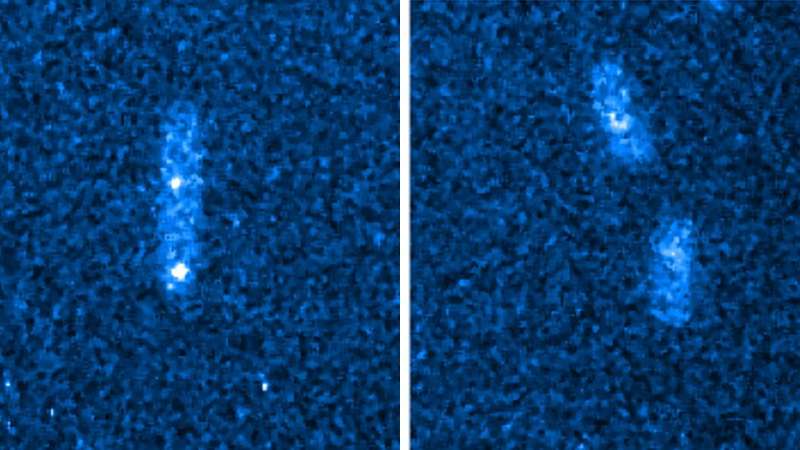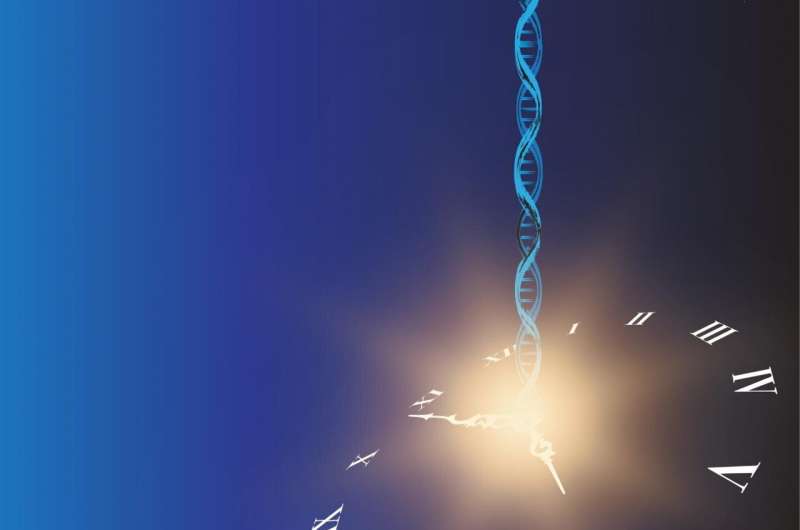Successful DNA replication in cyanobacteria depends on the circadian clock
https://phys.org/news/2021-05-successful-dna-replication-cyanobacteria-circadian.html
A new study from the University of Chicago has found that the photosynthetic bacterium Synechococcus elongatus uses a circadian clock to precisely time DNA replication, and that interrupting this circadian rhythm prevents replication from completing and leaves chromosomes unfinished overnight. The results, published online on May 10 in Proceedings of the National Academy of the Sciences, have implications for understanding how interrupted circadian rhythms can impact human health.
Circadian rhythms are the internal 24-hour clock possessed by most organisms on earth, regulating a diversity of biological functions including sleep/wake cycles, hormone production, digestion and body temperature. In humans, disruptions to the circadian rhythm—such as working a shift-work job or experiencing frequent jet lag—have been associated with an array of health problems, including obesity, cardiovascular and immune dysfunction, mood disorders and even cancer.
"In most species we've studied, if the circadian rhythm is disrupted or permanently changed, it's bad for the animal's health, but no one has really been able to explain what goes wrong if your clock is in the wrong state all the time," said senior author Michael Rust, Ph.D., Associate Professor of Molecular Genetics and Cell Biology at UChicago. "This cyanobacterial system is exciting because it gives us a chance to answer these mechanistic questions about how circadian rhythms are contributing to the health of an organism."
Despite the large evolutionary gap between humans and cyanobacteria, these tiny organisms can provide insights into critical cellular functions such as DNA replication. "The evidence suggests that circadian rhythms have evolved multiple times among different species, so there must be something very fundamental and important that's shared among these different species," said first author Yi Liao, a postdoctoral scholar in Rust's lab. "DNA replication is also a fundamental process, shared across species, which gave us a clue that it might be regulated by this clock."

The investigators were particularly interested in studying this process due to its lengthiness. "Some things are better to do during the day, like photosynthesis, while others are better at night, like fixing nitrogen," said Rust. "But DNA replication takes three to four hours to replicate the entire genome, so there's a fundamental need to predict the future. You commit to doing this thing and you don't know what the conditions will be like a few hours later. It seemed like maybe this process would use circadian rhythms to 'predict' the right time to start replication to ensure that it finishes during an optimal window of time."
Combining time-lapse fluorescent microscopy, mathematical modeling, molecular genetics and biochemical approaches, Liao and Rust were able to track DNA replication initiation, completion, and failures in bacteria exposed to different illumination patterns, including constant light, normal light/dark cycles and cycles with unexpected periods of darkness.
They found that the circadian clock creates rhythms in DNA replication even in the absence of environmental cues, such as the rising and setting sun. DNA replication typically begins when the clock state corresponds to the morning, and is suppressed when the clock predicts the arrival of night. However, when the internal clock of the bacteria predicts morning but the external environment unexpectedly becomes dark, ongoing replication can't be completed; the replication machinery disassembles, leaving cells with incomplete chromosomes.
"Many things are regulated by the circadian clock, but it is striking that it matters so much for DNA replication," said Rust. "If the clock is in the wrong state, it's the difference between completing the replication event, or the replication machinery falling apart completely."
These results, Liao says, open up even more questions. "What is the fate of these unfinished chromosomes? Does this lead to mutations?" he said. "Maybe this is a major driving force in the evolution of the circadian clock—you want to avoid damaged DNA and unfinished chromosomes, so the clock has evolved multiple times in history to prevent those things from happening."
In a post-Industrial Revolution society, surrounded by artificial lights that can be turned on and off at will, these results could have implications for how circadian rhythms impact human health and why extensive disruptions can be so damaging.
"One question that we still need to answer is whether or not this failure to complete DNA replication leads to mutation and genomic instability," said Rust. "Organisms may experience unexpected darkness on occasion, but their clocks get very strong signals from the cycle of the sun rising and setting. In humans, where we can control the illumination of our environment and ignore the sun, we know there are changes in the circadian rhythm and we know it causes problems, but it's not clear where those problems come from. We're trying to put our finger on a molecular mechanism for what might be the biggest problem if your circadian clock is in the wrong state."




No comments:
Post a Comment